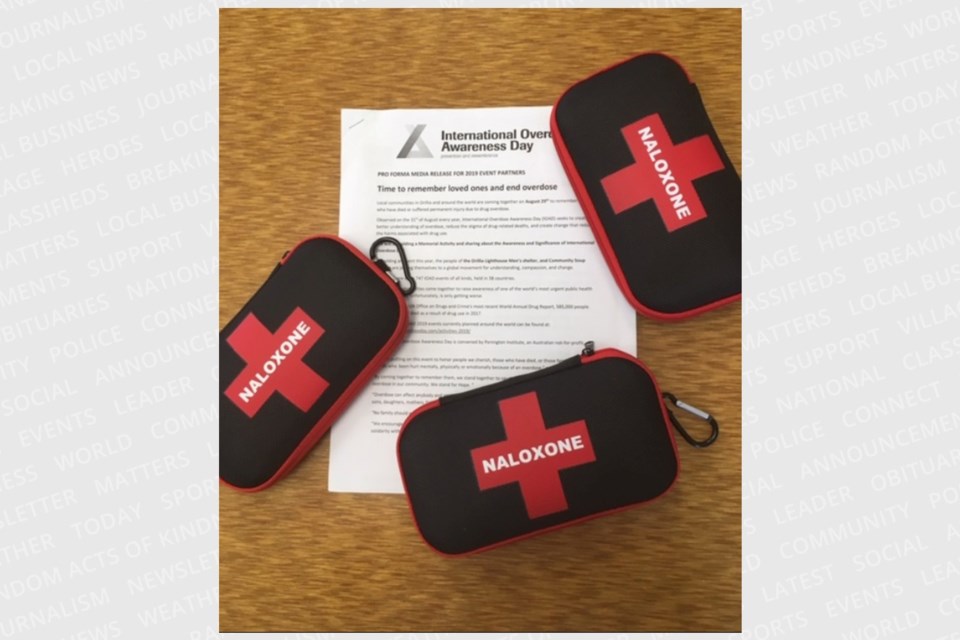A new provincial government program to make naloxone kits and training available for free to workplaces where there's a risk of staff witnessing or experiencing an opioid overdose is coming as welcome news locally.
According to the Simcoe Muskoka District Health Unit, between March 2022 June 2022 there have been 352 opioid-related deaths in Simcoe-Muskoka, which is more than 75 per cent higher than the 199 opioid-related deaths in the 25 months prior to the start of the COVID-19 pandemic.
In 2021, statistics show 2,819 people died from opioid-related causes in Ontario, which is the highest number on record, and up from 366 in 2003.
This week's announcement comes as Ontario says it will become the first jurisdiction in North America to require naloxone kits — a life-saving medication that can temporarily reverse an opioid overdose, restore breathing within two to five minutes, and allow time for medical help to arrive — be accessible in at-risk workplaces, starting in June 2023.
“This is an incredibly important step in reducing overdose deaths by ensuring that more people have access to naloxone when and where it is needed,” said Meredith Fryia, manager of addiction services with the Canadian Mental Health Association (CMHA) Simcoe County Branch.
Hayley Murdoch-Fyke, manager of Adult Justice Services at John Howard Society of Simcoe Muskoka, told BarrieToday she was 100 per cent in support of this training.
“Naloxone is such a key piece of harm reduction and survival for a lot of folks. All my staff are trained on it, obviously, and I have even had discussions with my six-year-old about it and shown him how to use it,” she said. “I know at this stage in his life he would not actually have to administer it, but I feel the education for everyone is such a necessity for the times we live in.”
Dr. Emil Prikryl, a public health and preventative medicine resident currently on rotation with the local health unit, told BarrieToday that public health officials are pleased to hear the Ministry of Labour’s plans to move forward with the workplace naloxone program.
“Expanding naloxone to those who need it most has the potential to save lives during the toxic drug poisoning crisis that we are experiencing locally, nationally and provincially,” he said. “We are hopeful to see what, over time, impacts this program will have on helping to prevent opioid overdoses.”
Naloxone is a very important tool of a larger toolbox needed to help prevent people from overdosing, Prikryl added.
“It’s a medication that can temporarily reverse the effects of an opioid overdose. Opioids bind to receptors in the brain, and this naloxone medication replaces the opioid within the receptor … and temporarily blocks the harmful effects and helps the person breathe again,” the doctor explained. “It starts to work fairly quickly in one to five minutes and works for about 30 to 90 minutes.”
Naloxone only works with opioids, he said, and does not prevent overdoses from cocaine, methamphetamine or other non-opioid drugs.
"Given the toxic illicit supply that we are experiencing, some of these drugs could be mixed with opioids, so administering naloxone is still recommended whenever an overdose is suspected,” Prikryl said. “Having a naloxone kit handy with you, for example in the workplace, can help empower people to help those around them … co-workers, friends, family. This can be very fundamental in helping to address the overdose prevention side of things.”
Prikryl noted that while the announcement is definitely a step in the right direction, there's still a lot of work that needs to be done by a variety of different sectors to address the issue.
“This is definitely the harm-reduction side of things … but there are other aspects of addressing the toxic drug poisoning crisis that are important to consider, too, like work around looking into possibilities for consumption and treatment services in our communities," he said. "It needs a much more comprehensive approach, but this naloxone workplace program would certainly be a part of that.”
The kits are available free of charge at most pharmacies across the region and no health cards are required. The health unit can also provide the kits and training for anyone who requests it.
“This toxic drug poisoning crisis is an ongoing burden and it’s a big priority," he said.
Businesses can determine if they are eligible for the program and find additional information on accessing naloxone kits and training at Ontario.ca/workplacenaloxone.



